 Childs' logo of 1907 Childs' logo of 1907 | |
 Childs Restaurant, Philadelphia, Pennsylvania, c. 1908 Childs Restaurant, Philadelphia, Pennsylvania, c. 1908 | |
| Industry | Restaurant |
|---|---|
| Founded | Manhattan, New York City, United States (1889 (1889)) |
| Founder | Samuel Childs, William Childs |
| Defunct | 1967; 58 years ago (1967) |
| Fate | None in operation since late 1960s |
| Number of locations | 107 locations in 29 cities in 1925 |
| Area served | New York City and other northeastern U.S. cities |
| Products | Pancakes, American cuisine |
Childs Restaurants was one of the first national dining chains in the United States and Canada, having peaked in the 1920s and 1930s with about 125 locations in dozens of markets, serving over 50,000,000 meals a year, with over $37 million in assets at the time. Childs was a pioneer in a number of areas, including design, service, sanitation, and labor relations. It was a contemporary of food service companies such as Horn & Hardart, and a predecessor of companies such as McDonald's.
History

The first Childs Restaurant was launched in 1889 by brothers Samuel S. Childs and William Childs, on the ground level of the Merchants Hotel (current site of One Liberty Plaza, also previously the Singer Building), at 41 Cortlandt Street (between Broadway and Church Street), in New York City's Financial District. The brothers' concept for the establishment was to provide economical meals to the working class, quickly, and with an unusually high emphasis – for the period – on cleanliness and hygiene. Their novel design format included white tiles, white uniforms, and waitresses instead of the then-common waiters. In addition to these signature characteristics, Childs locations also featured their pancake griddles in the front window. Within five years, Childs had grown to five profitable locations. They also are credited as inventors of the "tray line" self-service cafeteria format, which they introduced in 1898 at their 130 Broadway location.
In 1898, the brothers, confident and ready for more aggressive expansion, combined with several investors to legally incorporate the Childs Unique Dairy Company, with capitalization of $1,000,000, and the stated intent to "establish and operate restaurants in New York City and elsewhere". It was widely speculated, and finally confirmed in 1912, that several officers of the Standard Oil Company were investors in the restaurant chain, including Henry Morgan Tilford and Charles Sweeney.
In 1899, F.O. Hendrick, a nephew of Samuel and William Childs, launched a casual luncheon restaurant at 142 Fulton Street, practically across the street from his uncles' first location on Cortlandt Street, which was by then 10 years old and highly successful. After a short period of family competition, Hendrick ultimately brought his restaurant under the Childs umbrella, and remained an operating executive of Childs Restaurants until the family lost control.
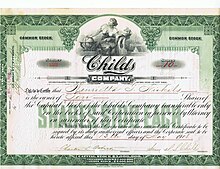
In 1906, fifteen similar restaurants (called "green doors") which were independently owned and operated by Ellsworth Childs (brother of Samuel and William) were consolidated into the company. Thereafter, Ellsworth remained an executive of Childs until his death in 1929, and is cited as a driving force behind the physical expansion during that period.
Peak years
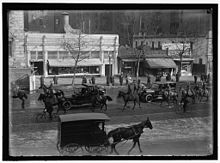
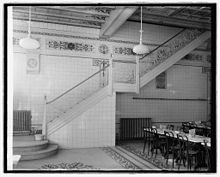
In September 1919, the company launched an employee stock ownership plan for its restaurant managers, and three years later, extended the plan to all employees. Within 10 years, employees would own almost 25% of the company's common stock.
In November 1920, an article in The Magazine of Wall Street, entitled "Where Everybody Eats Now and Then," called Childs "a national institution. Millions of people eat there at least once in a while and some eat much more often. . . . Most of the people who go into Childs' go in for quick lunches but you can get anything there from a doughnut to a steak."
By 1925, the chain operated 107 locations in 29 cities, served 50,000,000 meals every year, and was reporting consistent annual profits of $2,000,000. The company also grew to include other real estate interests. In March 1925, company president Samuel S. Childs died, although he had not been personally involved in the business for some time, instead focusing on his political career and many other civic and business activities. Operation of the restaurants had long been delegated to his brother and co-founder William, as vice president and general manager, and other family members.
The late 1920s witnessed a roller-coaster of events for the company. In November 1925, the Childs company became a major partner in the development of the landmark Savoy-Plaza Hotel, at Fifth Avenue and 59th Street. Around 1927, William Childs began to impose his vegetarian dietary preferences on the chain's menu, which generated significant backlash from customers and his fellow managers and investors. The company's stock reached a low of $44 in 1928, and during a board meeting on December 12, 1928, William was pressed into resigning as president, but remained chairman of the board. At the following board meeting on January 30, 1929, William attempted to turn the tide by firing several executive officers and company directors, replacing them with family members. A proxy battle ensued, but on March 7, 1929, William and his supporters lost the fight to retain control of the company he co-founded 40 years before, by then valued around $37,000,000. He did retain a modest non-controlling equity position, which he eventually sold and/or bequeathed.
Decline and rebirth
In the 1930s, no longer under the direction of the Childs family, the chain returned meat to its menus, introduced alcohol at many locations (after the repeal of Prohibition), and launched a new subsidiary division called "The Host", meant to be lower-priced than Childs. The company also obtained the hot dog vending license for the 1939 World's Fair in Flushing Meadows, which turned out to be a financial mistake.
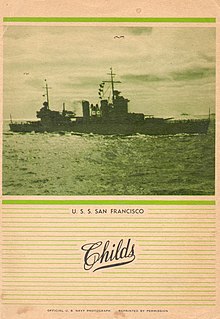
In August 1943, under pressure of significant debt maturity, the company filed for bankruptcy reorganization. Childs emerged from bankruptcy in 1947, and continued to operate through the 1940s and 1950s.
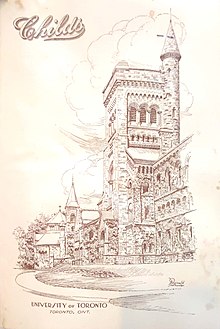
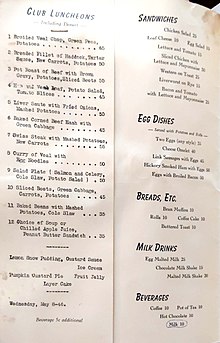

By 1950, the company had shrunk to only 53 locations, and was losing money. Nonetheless, it managed to acquire the candy and ice cream maker Louis Sherry Inc., and announced several significant operational changes, including "returning to its old custom of flap-jack making in the windows" and the introduction of prepared meats, to eliminate the need for butchering on-site.
In 1955, a young hotelier named A.M. "Sonny" Sonnabend assumed the presidency of the Childs company, and pointed the enterprise in a new direction. In a series of coordinated transactions, the company's name was changed to Hotel Corporation of America, it acquired the Plaza Hotel in New York (across the street from the Savoy-Plaza Hotel, which Childs had developed), and entered into long-term leases for three other hotels in Boston, Cleveland, and Chicago. The company was then structured into three divisions: restaurants, manufacturing and distribution of packaged foods (via subsidiaries Recipe Foods, Fred Fear, and Louis Sherry), and hotels.
In 1961, substantially all of the remaining Childs restaurant operations, now greatly diminished in number and considered part of the company's past, were sold to the Riese Organization (National Restaurants Management Inc.), which as of 2009 operates more than 100 restaurants throughout New York City, including franchised units of Dunkin' Donuts, KFC, Pizza Hut, T.G.I. Friday's and Houlihan's. A number of the Riese properties are former Childs Restaurants.
In 1970, Hotel Corporation of America (formerly Childs) was again renamed, to Sonesta International Hotels Corporation (Nasdaq: SNSTA). As of 2009, the company operates 25 hotels on three continents, and owns several cruise ships, and is still led by the Sonnabend family.
Architecture
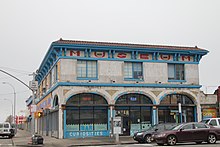
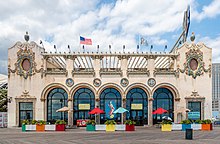

Despite their market position, Childs Restaurants were distinguished for their architectural quality, and former locations continue to be appreciated by historic preservationists. In his design and construction efforts, William Childs and his internal architect of 30 years, John Corley Westervelt, consulted and engaged respected architects including William Van Alen (modernist designer of the Chrysler Building), Hirons & Dennison, Pruitt & Brown, and McKim, Mead, and White. One design critique from 1924 declared that Childs "stands as a milestone marking an enormous advance in the taste of what we are pleased to describe as the 'common people' of America". In more recent years, celebrated architect Robert A.M. Stern described the Childs design as "austerely-elegant", and recognized their savvy in tailoring design to environment, such as in midtown Manhattan, where Childs was the first to make "dramatic use of large sheets of curved glass for corner windows", now a common technique.
Notable locations
The table that follows is an incomplete list of locations that were built for Childs and reflect the company's style. Note that references often have pictures and more detailed histories, and links in the Address column, where provided, link to individual Misplaced Pages articles about the buildings listed:
| Place | Address | Completed | Notes and 2014 Status | References |
|---|---|---|---|---|
| Manhattan, NY | 815 Broadway | 1897 | By John C. Westervelt. In use as a small commercial building. | |
| Manhattan, NY | 36 West 34th Street | 1904 | By John C. Westervelt (alteration of 1885 building). In use as a commercial building. Westervelt's office was here until his death in 1934. | |
| Manhattan, NY | 194 Broadway | 1911 | By John C. Westervelt. Demolished in 2007 to build the Fulton Center at the existing Fulton Street station. | |
| Brooklyn, NY | 1208 Surf Avenue | 1917 | By John C. Westervelt. Closed 1943. Designated New York City landmark, home of Coney Island USA arts organization. | |
| Toronto, ON | 279 Yonge Street | 1918 | By John C. Westervelt. Closed by 1963. In use as a Hard Rock Cafe until c. 2015. Currently a Shoppers Drug Mart. | |
| Brooklyn, NY | 530 Fulton Street | 1919 | By John C. Westervelt. In use as a commercial building. | |
| Manhattan, NY | 377 Fifth Avenue | 1921 | By Severance and Van Alen. In use as a commercial building. | |
| Brooklyn, NY | 219 South 4th Street | 1922 | Has plaque with what looks like a Childs logo and year built, but Brooklyn phone books of the period indicate it was occupied by a ladies tailor business called "Childs Bros." that despite its similar name had no known connection to the restaurant chain. Presently a commercial building. | |
| Brooklyn, NY | 2102 Boardwalk | 1923 | By Dennison & Hirons. Closed 1952. Designated New York City landmark, now part of Ford Amphitheater at Coney Island. Prototype for later nautical themed buildings. | |
| Manhattan, NY | 604 Fifth Avenue | 1925 | By William Van Alen. Altered, in use as a T.G.I. Friday's until 2015. | |
| Queens, NY | 63-19 Roosevelt Avenue | 1925 | Nautical theme. In use as a commercial building. | |
| Manhattan, NY | 421 Seventh Avenue | 1926 | By William Van Alen. 14 story building housed a restaurant on ground floor and some corporate functions above. By 1940 restaurant had moved next door to 425 Seventh Ave. Altered, in use as an office building with ground floor retail. | |
| Washington, D.C. | 2 Massachusetts Avenue NW | 1926 | By William Van Alen. Closed 1955. In use as a bank. | |
| Atlantic City, NJ | Boardwalk at South Carolina Avenue | 1927 | Nautical theme. Attributed to George P. Post. In use as a commercial building. | |
| Queens, NY | 36-01 Broadway | 1928 | Nautical theme. In use as a commercial building. | |
| Trenton, NJ | 12-14 East State Street | 1928 | Modernist, designer not known. Closed by 1950s. Demolished in 1987. | |
| Manhattan, NY | 811 6th Avenue | 1930 | Nautical theme. Altered, in use as a McDonald's. | |
| Queens, NY | 67-09 Fresh Pond Road | 1930 est. | Nautical theme. In use as a bank and small office building. | |
| Brooklyn, NY | 534 Flatbush Avenue | 1931 | Nautical theme. In use as a commercial building. | |
| Queens, NY | 59-37 Queens Boulevard | 1931 | Nautical theme. In use as a commercial building. | |
| Queens, NY | 45-02 43rd Avenue | 1931 | Nautical theme. In use as a commercial building. | |
| Brooklyn, NY | 6620 18th Avenue | 1931 | Nautical theme. Demolished c. 2007. | |
| Queens, NY | 15-02 College Point Blvd. | 1931 est. | Nautical theme. In use as a commercial building. | |
| Brooklyn, NY | 1801 Avenue M | 1931 est. | Nautical theme.In use as a commercial building. | |
| Queens, NY | 245-01 Jamaica Avenue | 1932 | Nautical theme. In use as a commercial building. |
Closing dates, where known, are indicated in the above table. None of the nautical themed restaurants built in the early 1930s appear in 1940 telephone directories, indicating that Childs' had vacated those structures by that date. The earlier locations in Manhattan and Brooklyn do appear in those directories, except for the very early location at 815 Broadway and the South 4th Street location, which is not known to have been a restaurant.
The following locations were not necessarily built by the Childs Company, but are notable for other reasons:
- New York
- 41 Cortlandt Street, New York, NY (first location)
- 42 East 14th Street, New York, NY (longtime corporate headquarters, also housed a restaurant)
- 200 Fifth Avenue, New York, NY (corporate headquarters in later years)
- 3 Beaver Street, New York, NY (Demolished in 1928 to build part of 26 Broadway, also known as the Standard Oil Building)
- 1501 Broadway (at 43rd Street), New York, NY (below the Paramount Theater)
- 1551–1553 Broadway (at 46th St NW corner), New York, NY
- 1546 Broadway (between 45th & 46th Streets), New York, NY
- 2276 Broadway (at 82nd Street), New York, NY
- 300–304 W 59th St (SW Corner Columbus Circle), New York, NY
- 1939 New York World's Fair: this temporary location, in the Fair's Railroad Building, seated 1000 patrons, and featured elaborate murals.
- Washington, D.C.
- 1423 Pennsylvania Avenue N.W., Washington, DC
- New Jersey
- Tennessee Avenue, Atlantic City, NJ, replaced in 1927 by a company-built location one block away at South Carolina Avenue
- Missouri
- 218-220 North Seventh St & 614-616 Olive St, St. Louis. The North Seventh location was leased in 1903 in expectation of the crowds at the Louisiana Purchase Exposition in 1904. In 1912 Child's leased 614–616 Olive St, which abutted the back of their N. Seventh St. location, allowing for entrance to the expanded restaurant from both streets. Childs added a second story to the building in 1915 by which point they were the stated owners of the property. Both locations would become referenced in advertising from 1915 until 1935, when the location closed.
- 804 Washington St, St. Louis.
- 1121 Walnut St, Kansas City.
- Maryland
- 18 North Charles St, Baltimore. 1906-1953
- Rhode Island
- 142 Westminster St., Providence. 1910-1974
- Georgia
- 10 Marietta St., Atlanta.
Related businesses
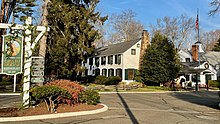
Although legally separate from the core Childs Restaurants chain, the founders and various family members operated a number of other businesses throughout the 20th century. Below are brief summaries of those operations.
In 1929, William Childs purchased a historic property near his home in Franklin Corners, New Jersey and converted it – without making any structural modifications – to an inn and restaurant. The Olde Mill Inn and The Grain House Restaurant. This upscale operation was distinctly different from the traditional Childs Restaurants, yet it also met with great success. The family continued to operate it for some time, but The Olde Mill Inn and Grain House Restaurant was eventually acquired by The Bocina Group, which continues to operate it as of 2009.
In December 1929, after being ousted from the core company, William Childs announced that the family had taken over the Archambault Restaurant at 2678 Broadway, and would relaunch it as "Old Algiers" – the first in a series of "old-world" themed restaurants. In this business, he partnered primarily with three nephews, Ellsworth E. Childs, William S. Childs, and Wallace A. Childs. The new company was soon organized under the corporate name Old London Inc., which was also the theme of their second 1,000-seat location, launched in 1931 at 130 West 42nd Street. This enterprise did not expand much further, likely due to William's advancing age. He died in 1938, and is buried behind the Basking Ridge Presbyterian Church near his New Jersey estate, with a large number of other Childs family members.
As of 2009, the original F.O. Hendrick location is still an operating diner, now called the Anytime Cafe.
Key executives
Family-controlled period
- Samuel S. Childs, co-founder and president (1889–1925)
- William Childs, co-founder, vice president and general manager (1889–1925), chairman and president (1925–1929/30)
- Luther Childs, director (? – 1929)
- Ellsworth Childs, director (1906–1929), treasurer (1929)
- William S. Childs, director (? – 1929)
- F.O. Hendrick, general manager (? – 1929)
- William A. Barber, general counsel
Later period
- S. Willard Smith, president (1929–1931)
- William P. Allen, president (c. 1932)
- George D. Strohmeyer, president (1933–1941)
- Edward C. Field, president (1941–1948)
- John F.X. Finn, court-appointed trustee (1943–1947)
- John L. Hennessey, president (1948–1949) (former president of Statler Co., Inc.)
- John J. Bergen, chairman (c. 1950)
- N. Clarkson Earl Jr., president (1950–1951) (former executive at Howard Johnson's Restaurants)
- Charles Crouch, executive vice president (c. 1950)
- Abraham M. Sonnabend, president (1954–1963) (Converted Childs into Hotel Corporation of America, later Sonesta International Hotels Corporation)
In popular culture
In music
The song "By the Beautiful Sea", written by Harry Carroll and Harold R. Atteridge in 1914, includes the lines:
Joe was quite a sport on a Sunday,
Though he would eat at Childs on a Monday
The song "Manhattan", written by Rodgers and Hart in 1925 for the musical revue Garrick Gaieties, and famously recorded by Tony Bennett, Ella Fitzgerald and others, includes the lines:
We'll go to Yonkers – where true love conquers – in the wilds,
And starve together dear – in Childs
In print
The 1920 novel Main Street, written by Sinclair Lewis, talks of the main characters eating at a Childs restaurant to economize while traveling to Minneapolis.
The poem "Spain in Fifty-Ninth Street", written by E.B. White and originally published in The New Yorker in 1935, tells the story of a brief but emotional interaction between a Childs hostess and a random customer (described as a "man of affairs") at the "Spanish Childs" location, presumably on 59th Street. White wrote a number of other short stories and poems that referenced or featured Childs, likely due to the daily presence of the establishments in his life during the late 1920s and 1930s in New York City.
In film
A Childs restaurant is shown during a montage of the streets of Manhattan being cleared by police during the rampage of the Rhedosaurus in The Beast from 20,000 Fathoms.
The opening montage sequence of Neil Simon and Gene Saks' 1968 film The Odd Couple includes a shot of a neon-signed Childs restaurant in New York City, one of several locations Felix Ungar (Jack Lemmon) visits before checking into a fleabag hotel to try to commit suicide.
Taxi Driver directed by Martin Scorsese 1976. Main character Travis Bickle takes Betsy, played by Cybill Shepard, to Child's restaurant in Columbus Circle on their first date.
In television
Jimmy Darmody suggests to Richard Harrow, "Let's go get a steak" in the season 2 finale of Boardwalk Empire, "To the Lost".
Onstage

Playwright David Belasco incorporated a complete reproduction of a Childs Restaurant in his 1912 production of Alice Bradley's The Governor's Lady.
The 1936 play You Can't Take It with You by George S. Kaufman and Moss Hart features the character The Grand Duchess Olga Katrina, a displaced cousin of the Czar, who works as a waitress at Childs.
Composer George Antheil, who spent part of the 1920s in New York City, selected a Childs Restaurant as one of several iconic American locations (along with the Bowery and the Brooklyn Bridge) for the setting of his 1930 opera Transatlantic.
In the 1953 musical Wonderful Town, which depicted life in New York City during the 1930s, the song "What A Waste" (music by Leonard Bernstein; lyrics by Betty Comden and Adolph Green) in Act I includes the lyrics:
Girl from Mobile,
Versatile actress,
Tragic or comic,
Any old play,
Suffered and starved,
Met Stanislavsky.
He said the world would
Cheer her some day.
Came to New York,
Repertoire ready,
Chekhov's and Shakespeare's and Wilde's.
Now, they watch her flipping flapjacks at Childs.
What a waste,
What a waste,
What a waste of money and time!
References
- ^ Austin, Kenneth L., "Childs Company Ups and Downs", The New York Times, August 29, 1943
- Women would work for lower wages than men.
- ^ "Childs Restaurant Founder Is Dead: Samuel S. Childs", The New York Times, March 18, 1925
- Zuber, Amy, "William & Samuel Childs", Nations Restaurant News, February 1996
- "Childs Unique Dairy Company", The New York Times, November 27, 1898
- "Standard Oil Money To Extend Childs", The New York Times, June 6, 1912
- "In The Real Estate Field", The New York Times, August 1, 1899
- "Ellsworth Childs Dies Suddenly At 60", The New York Times, Page 23, April 18, 1929
- "Ellsworth Childs Leaves Small Estate", The New York Times, Page 12, July 3, 1929
- "Owner-Employees Face Two Tests; Battles for Control of Childs and Standard Oil...", The New York Times, March 3, 1929
- Miller, A. T. (November 13, 1920). "Where Everybody Eats Now and Then". The Magazine of Wall Street. 27 (1): 27–28. Retrieved December 8, 2021.
- "$10,500,000 Bonds for Savoy-Plaza", The New York Times, November 29, 1925
- "Going Vegetable-wise", Time, March 19, 1928
- ^ "Childs' War", Time, February 11, 1929
- ^ "Childs Returns to the Restaurant Business; Buys the Archambault...", The New York Times, December 9, 1929
- "Childs Co Control Seized By Family", The New York Times, January 31, 1929
- "Childs Is Ousted At Stormy Board Session", The New York Times, Page 17, March 8, 1929
- "Business & Finance: Stewart Out, Childs Out", Time, March 18, 1929
- "William Childs Left Estate to Relatives", The New York Times, July 29, 1938
- "Repeal Cuts Price of Drinks In Half", The New York Times, December 5, 1933
- "Childs Plan Approved; Order of Confirmation Is Issued...", The New York Times, Page 29, December 24, 1947
- "Childs Executive Now Heads Sherry", The New York Times, May 25, 1950
- "Childs Co Changes Name" The New York Times, Page 42, February 23, 1956
- ^ Sonesta Intl Hotels Corp Company History, retrieved April 25, 2009
- ^ "Childs Vote Scheduled; Company Proposes Lease and Purchase of Hotels", The New York Times, Page 53, September 28, 1955
- "Childs Approves Plaza Purchase", The New York Times, Page 37, November 18, 1955
- Fowler, Glenn, "Irving Riese, 71, A Restaurateur Specializing In Fast Food Outlets", The New York Times, December 11, 1990
- The Riese Organization Corporate History Archived April 26, 2009, at the Wayback Machine, obtained April 23, 2009
- Entity Information for "Sonesta International Hotels Corporation", formerly known as "Childs Company", New York Department of State, Division of Corporations
- ^ Report of New York City Landmarks Preservation Commission, February 3, 2003, Designation List 344, LP-2106 Archived March 20, 2009, at the Wayback Machine, obtained April 24, 2009
- ^ Gray, Christopher, "Streetscapes: The Childs Building; Fast Food, Then and Now, On Stylish Fifth Avenue", The New York Times, November 6, 1988
- Gray, Christopher, "Streetscapes: The Former Childs Restaurant in Coney Island", The New York Times, July 1, 2002
- Gray, Christopher, "Streetscapes: William Van Alen; An Architect Called the 'Ziegfeld of His Profession'", The New York Times, March 22, 1998
- Dunlap, David W., "A Long Farewell to a Restaurant's White-Tiled Past", The New York Times, March 20, 2008
- "J.C. Westervelt, Architect, 61, Dies", The New York Times, April 9, 1934
- Laurence, F.S., The American Architect & The Architectural Review, September 10, 1924
- Stern, Robert A. M., et al, New York 1930, Architecture and Urbanism Between the Two World Wars (New York: Rizzoli, 1987), pp. 275–6.
- "815 Broadway". CastIronNYC.org. Metropolitan Chapter of the Victorian Society in America. Retrieved May 24, 2014.
- "The 1904 Facelift of No. 36 West 34th Street". Daytonian in Manhattan (Blog). January 18, 2014. Retrieved May 24, 2014.
- "Fade From White: Memories of Pancakes at Childs". The New York Times. July 31, 2007. Retrieved April 27, 2014.
- "Childs Restaurant Building (Designation Report)" (PDF). New York City Landmarks Preservation Commission. Archived from the original (PDF) on March 26, 2013. Retrieved April 28, 2014.
- Baldock, Melissa, "From Food To Freak Shows: Coney Island's Unsung Childs Restaurant" Archived April 28, 2009, at the Wayback Machine, Municipal Art Society of New York, April 14, 2009, retrieved on April 24, 2009
- "Yonge Street/Then and Now". Lost Toronto. January 5, 2011. Retrieved May 17, 2014.
- "My Toronto Art Deco trip - Part 1". Natalie Servant Designs. Retrieved May 17, 2014.
- "530 Fulton Street Certificate of Occupancy" (PDF). New York City Department of Buildings. Archived from the original (PDF) on May 25, 2014. Retrieved May 24, 2014.
- ^ "Brooklyn Telephone Directory, Winter 1939-1940". New York Telephone Company. Retrieved May 24, 2014.
- "530 Fulton Street View". Google Maps. Retrieved May 24, 2014.
- "Manhattan New Building Database, 1900-1986". Enter "Childs" in owner field. Office for Metropolitan History. Retrieved May 28, 2014.
- "377 Fifth Avenue Certificate of Occupancy" (PDF). New York City Dept. of Buildings. Archived from the original (PDF) on May 25, 2014. Retrieved May 24, 2014.
- "Latest Dealings in the Realty Field" (PDF). The New York Times. October 19, 1919. Retrieved May 24, 2014.
- "NYCityMap". Borough: Brooklyn Block: 2433 Lot: 39. City of New York. Retrieved May 3, 2014.
- "Google Maps". 219 S. 4th Street, Brooklyn, NY. Google, Inc. Retrieved May 3, 2014.
- "Child's Restaurant, South 4th Street". TUESDAY, JULY 22, 2008. Joel Kimmel. Retrieved May 3, 2014.
- "Brooklyn, Queens, Staten Island; New York City Telephone Directory (1927)". New York Telephone Company. 1927.
- "(Former) Childs Restaurant Building (Designation Report)" (PDF). New York City Landmarks Preservation Commission. Archived from the original (PDF) on March 26, 2013. Retrieved April 27, 2014.
- "Next on the List for Coney Island: A New Theater". The New York Times. April 10, 2013. Retrieved April 28, 2014.
- "The History of 3 Midtown Neighbors". The New York Times. July 22, 2010. Retrieved April 27, 2014.
- "Woodside, Queens, Part 2". Forgotten New York. October 22, 2005. Retrieved April 27, 2014.
- "NYCityMap". Borough: Queens Block: 1233 Lot: 49. City of New York. Retrieved April 27, 2014.
- "Certificate of Occupancy - 421-23 Seventh Avenue" (PDF). New York City Department of Buildings. Retrieved June 17, 2014.
- "Manhattan Block 809 Lot 1". CityMap. City of New York. Retrieved June 17, 2014.
- "[421-23?] 7th Avenue. Childs Building". mcny.org. Museum of the City of New York. Archived from the original on June 17, 2014. Retrieved June 17, 2014.
- ^ "Manhattan Telephone Directory, 1940 Issue". New York Telephone Company. p. 189. Retrieved May 25, 2014.
- "Lost Fast Food: Childs Restaurants in Washington". StreetsofWashington. November 28, 2010. Retrieved April 27, 2014.
- Greater Greater Washington, November 30, 2010, obtained December 2, 2010
- "Lorraine hair nets, Child's Restaurant, Hotel Belmont (3 advertisements) (1938 photo showing Childs in operation at this site)". Duke University Libraries. Retrieved September 23, 2020.
- "NYCityMap". Borough: Queens Block: 649 Lot: 5. City of New York. Retrieved May 16, 2014.
- "Broadway in Queens, Part 1". Forgotten New York. January 17, 2009. Retrieved May 16, 2014.
- "Historic American Buildings Survey" (PDF). HABS No. NJ-963. U.S. Department of the Interior. Archived from the original (PDF) on April 29, 2014. Retrieved April 27, 2014.
- "This is not just another McDonald's". Ephemeral New York. Retrieved April 27, 2014.
- "NYCityMap". Borough: Queens Block: 3620 Lot: 7. City of New York. Retrieved May 16, 2014.
- "Ridgewood, Queens". Forgotten New York. July 28, 2005. Retrieved May 16, 2014.
- "NYCityMap". Borough: Brooklyn Block: 5024 Lot: 67. City of New York. Retrieved May 17, 2014.
- "Childs Restaurant Building Still Standing on Queens Boulevard". Brownstoner Queens. June 19, 2013. Retrieved April 27, 2014.
- "NYCityMap". Borough: Queens Block: 1334 Lot: 77. City of New York. Retrieved April 27, 2014.
- "Childs Restaurant". Eating In Translation. Retrieved May 3, 2014.
- "NYCityMap". Borough: Queens Block: 160 Lot: 23. City of New York. Retrieved May 3, 2014.
- "NYCityMap". Borough: Brooklyn Block: 5560 Lot: 52. City of New York. Retrieved May 16, 2014.
- "18th Avenue, Brooklyn". Forgotten New York. February 10, 2008. Retrieved May 16, 2014.
- "StreetView". 2007 view showing intact Childs building which later views do not. Google Inc.
- "15-02 College Point StreetView". maps.google.com. Google, Inc. Retrieved June 17, 2014.
- "Queens Block 4076 Lot 14". CityMap. City of New York. Retrieved June 17, 2014.
- "NYCityMap". Borough: Brooklyn Block: 6738 Lot: 49. City of New York. Retrieved May 16, 2014.
- "Coney Island to Midwood, Brooklyn, Part 2". Forgotten New York. December 19, 2010. Retrieved May 16, 2014.
- "JERICHO TURNPIKE, Floral Park-Bellerose, Queens". Forgotten NY. August 5, 2007. Retrieved May 3, 2014.
- "NYCityMap". Borough: Queens Block: 8659 Lot: 1. City of New York. Retrieved May 3, 2014.
- "Queens Telephone Directory, Winter 1939-1940". New York Telephone Company. Retrieved May 25, 2014.
- "1907 Childs Menu". Menu with locations on reverse. New York Public Library. p. 2. Retrieved May 25, 2014.
- "NYC Landmarks Preservation Commission Report on Standard Oil Building" Archived May 24, 2011, at the Wayback Machine, See Note 4, obtained March 5, 2010
- Thurber, James, "The Talk of the Town, Childs in Paramount", The New Yorker, June 9, 1928, p. 9
- ^ "Stench Bombs in Childs; Three Restaurants Raided, but Diners Are Not Affected", The New York Times, August 18, 1936
- "Times Square Plot Bought By Childs", The New York Times, Page 31, June 23, 1920
- "New Childs Restaurant", The New York Times, May 14, 1920
- "About New York: Noted Night-Life Restaurant Quits in Tearful Memory of 42 Years" (PDF). The New York Times. December 11, 1953. Retrieved April 28, 2014.
- Biederman, Marcia, "Journey to an Overlooked Past", The New York Times, June 11, 2000
- "In The Real Estate Field: Big Lease In Columbus Circle", The New York Times, Page 17, December 23, 1910
- "George D. Strohmeyer (President of Childs Company) with hostesses". See caption on reverse. New York Public Library.
- "Childs Restaurant: 1917", Shorpy.com Blogsite, March 9, 2009, obtained April 24, 2009
- Ristine, James D. & Pergament, Allen, Atlantic City (Arcadia Publishing, 2008, ISBN 0-7385-5704-8), Pages 61–62
- "Beach Skyscraper Open...", The New York Times, Page 12, March 4, 1906
- The St. Louis Republic. , November 12, 1903, Page 2
- St. Louis Post-Dispatch, July 28, 1912, page 28
- The St. Louis Star and Times, July 6, 1913, page 18
- The American Contractor, Volume 36, 1903, page 16
- St. Louis Post-Dispatch, May 5, 1935, page 24
- St. Louis Post-Dispatch, December 11, 1984, Page 19
- The Kansas City Times, August 17, 1911, Page 9
- The Baltimore Sun, September 6, 1906, Page 3; The Baltimore Sun, December 27, 1953, Page 24
- Lost Restaurants of Providence By David Norton Stone, 2019, Arcadia Publishing, Page 95
- The Atlanta Constitution, January 19, 1919, Page 6
- "William S. Childs, A Restaurateur, 52", The New York Times, Page 30, February 20, 1952
- "New Restaurant Chain: William Childs Opens 'Old Algiers'", The New York Times, April 30, 1930
- E. B. White, "The Talk of the Town, Newest Old Place", The New Yorker, June 20, 1931, p. 7
- "William Childs Dead; Restaurant Man", The New York Times, May 23, 1938
- "William Barber, Legal Leader, 80", The New York Times, Page 28, February 9, 1950
- "S. Willard Smith, 77, Once Headed Childs", The New York Times, Page 13, July 9, 1949
- ^ "Strohmeyer Heads Childs Company", The New York Times, Page 29, March 31, 1933
- "George D. Strohmeyer Is Dead, Lead Chain of Childs Restaurants, The New York Times, Page 39, February 11, 1965
- "Heads Childs Company, E.C. Field Elected President of Restaurant Chain", The New York Times, Page 25, June 27, 1941
- "New Chef At Childs", Time, December 13, 1948
- "Food Authority Elected Head of Childs Company", The New York Times, Page 41, November 30, 1948
- "Childs President Quits; John L. Hennessy Will Remain As Director", The New York Times, Page 19, August 27, 1949
- Smith, Gene, "Personality: Navy, Baseball and Business; Graham-Paige Chief...", The New York Times, Page F3, July 27, 1958
- "N. Clarkson Earl Dies at 68; Led Childs Restaurant Chain", The New York Times, Page 47, February 19, 1969
- "A.M. Sonnabend Is Dead At 67", The New York Times, February 12, 1964
- "By the beautiful sea (sheet music)". Library of Congress. Retrieved July 11, 2023.
- White, E. B., Poetry: "Spain In Fifty-Ninth Street", The New Yorker, June 15, 1935, p. 14
- The Odd Couple theme song, film soundtrack, original music score, YouTube
- "New Opera To Be Laid In Childs Restaurant...", The New York Times, February 16, 1930, Page 28
- Watson, Steven (2000). Prepare for Saints: Gertrude Stein, Virgil Thomson, and the Mainstreaming of American Modernism. University of California Press. p. 327. ISBN 978-0-520-22353-0. Retrieved March 2, 2020.
- Lyrics from "What A Waste", Wonderful Town, 1953, based on life in New York City.
External links
 Media related to Childs Restaurants at Wikimedia Commons
Media related to Childs Restaurants at Wikimedia Commons